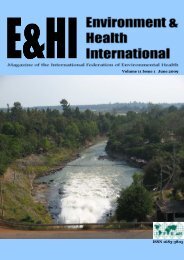IFEH ISSUE 6 - International Federation of Environmental Health
IFEH ISSUE 6 - International Federation of Environmental Health
IFEH ISSUE 6 - International Federation of Environmental Health
- No tags were found...
Create successful ePaper yourself
Turn your PDF publications into a flip-book with our unique Google optimized e-Paper software.
Past, Present and Future Developments in<br />
<strong>Environmental</strong> <strong>Health</strong> Education and<br />
Pr<strong>of</strong>essional Practice in Malawi (UNIMA &<br />
MEHA)<br />
Samanyika, Y.1, Grimason, A.M.1,2,3,4, Tembo, K.C.1, Chunga, P.1, Jabu, G.C.1,2, Kambala,<br />
C.1,2,5, Lungu, K.K.1,2, Morse, T.D.2,3,4,5, Taulo, S.C.1,2<br />
1. Malawi <strong>Environmental</strong> <strong>Health</strong> Association, 2. University <strong>of</strong> Malawi, 3. Royal <strong>Environmental</strong> <strong>Health</strong><br />
Institute <strong>of</strong> Scotland, 4. Africa Academy for <strong>Environmental</strong> <strong>Health</strong>, 5. Africa Women <strong>Environmental</strong><br />
<strong>Health</strong> Network<br />
Correspondence: agrimason@poly.ac.mw.<br />
“For millions <strong>of</strong> children today, particularly in Africa, the biggest health challenge is to<br />
survive until their fifth birthday, and their chances <strong>of</strong> doing so are less than they were a<br />
decade ago.”<br />
(Lee Jong-wook, Director –General, World <strong>Health</strong><br />
Organization, World <strong>Health</strong> Report 2003).<br />
“It is an appalling fact that, <strong>of</strong> all who are born <strong>of</strong> the labouring classes in Manchester (UK),<br />
more than 57% die before they attain 5 years <strong>of</strong> age, that is, before they can be engaged in<br />
factory labour.”<br />
(Edwin Chadwick, Sanitary Commissioner,<br />
Report on the Sanitary Condition <strong>of</strong> the Labouring Population 1842).<br />
INTRODUCTION<br />
Since the mid 70’s <strong>Environmental</strong> <strong>Health</strong> Officers (EHOs) in the UK have been educated to honours<br />
degree level with the curricula periodically reviewed and accredited by the appropriate pr<strong>of</strong>essional<br />
body i.e. The Royal <strong>Environmental</strong> <strong>Health</strong> Institute <strong>of</strong> Scotland (REHIS) and the Chartered Institute <strong>of</strong><br />
<strong>Environmental</strong> <strong>Health</strong> (CIEH) for England, Wales and Northern Ireland. Prior to then, the preliminary<br />
qualification for Public <strong>Health</strong> Officers was a three-year Diploma in Public <strong>Health</strong>. Upon graduation<br />
and after approximately one year <strong>of</strong> practical training, working <strong>of</strong>ten with a local authority, graduates<br />
take a pr<strong>of</strong>essional exam leading to full qualification. Thereafter, practising <strong>of</strong>ficers are expected to<br />
ensure that their knowledge and skills are updated through participation in various schemes <strong>of</strong><br />
continuous pr<strong>of</strong>essional development. This is a compulsory requirement for EHOs to remain registered<br />
as a member <strong>of</strong> the pr<strong>of</strong>essional bodies. The development and practice <strong>of</strong> <strong>Environmental</strong> <strong>Health</strong> in UK<br />
since the Victorian age has resulted in significant improvement to the environment and health <strong>of</strong> the<br />
14



